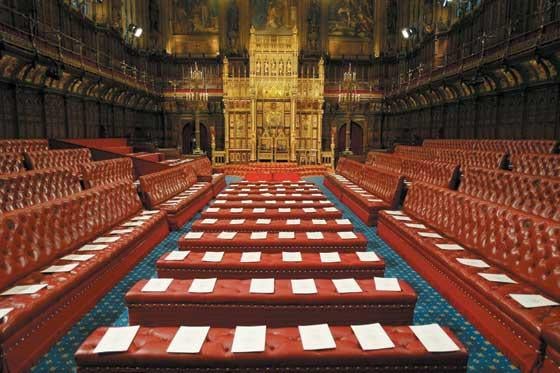
The prime minister’s morning press briefing and all major government press conferences should be televised to improve transparency in politics, a Lords committee has recommended.
In its review of government communications, published today, the House of Lords communications committee said it was deeply concerned that ministers were leaking policy decisions to preferred journalists before they were announced in parliament.
The report, based on evidence from journalists and civil servants, described the Lobby – the group of 180 journalists officially accredited to cover parliament – as a “barrier to openness” and called for a “fair and equal” system for media announcements.
“The evidence we received from journalists suggested that ‘friendly’ journalists are sometimes told the content of Government announcements before they are made formally,” the committee found.
“An obvious reason for doing this is to secure favourable and prominent coverage for a Government policy in return for exclusivity.”
The ministerial code requires that important announcements on Government policy be made to parliament first – giving the press, the public and the opposition the information at the same time.
Lord Fowler, the former Times journalist who chairs the Lords communication committee, said: “It is vital that when important announcements are made they are made first to parliament.
“[Gordon Brown’s] premiership has not ended the trend for ministers and government departments to make their policy announcements outside parliament first. It is important that this is stopped.
‘Inner circle’
The Lords report said that, under the current Lobby system, there was ‘a sense that there is an inner circle of reporters who get access to government information denied to other journalists”.
Streaming the Lobby briefing given to journalists each morning by the prime minister’s spokesman live on the Downing Street website, with the footage made available to broadcasters, would ‘help dispel continuing myths about the Lobby and the sense of secrecy that surrounds it”, the group of peers said.
The committee also called for the weekly media briefing on parliamentary business given by the Leader of the House of Commons to be reinstated.
The group were told in evidence that Harriet Harman had abandoned the traditional weekly briefings on the following week’s business, which allowed political reporters to question her about government policy, because they were ‘uncomfortable”.
One of the journalists who gave evidence to the group of peers last year, Computer Weekly executive editor Tony Collins, claimed to have been banned from a Department of Health press conference on a new government IT project because it was not intended for the trade press.
The committee said it was concerned that journalists felt that access to some press conferences was dependent on the type of coverage they were likely to give.
“This perception can only fuel the breakdown in trust between the media and the Government,” the report said.
“We recommend that all Government press conferences should be as open as possible and that all major press conferences should be live on the internet so that they are open for anyone to listen to.”
Communications staff
Lord Fowler’s review of government communications was launched last year, with the task of inquiring into whether media relations with the government have improved since they were last reviewed in 2004 by former Guardian Media Group chief executive Bob Phillis.
One of the recommendations by the Phillis review was that a minister should brief the media in televised briefings. The recommendation was not accepted by the Government, which has continued twice-daily briefings to political journalists by the prime minister’s spokesman, now Michael Ellam.
Today’s report also found that the number of government press officers has increased by 73 per cent in the past 10 years – up from 795 to 1,376.
The Lords committee criticised the Government for not providing enough statistics about the amount it spends on communications staff. The Cabinet Office told the committee that it was “very difficult to specify”.
“The public are entitled to know far more accurately than at present the value for money they are receiving from the government’s communication organisation,” Lord Fowler added.
“There is a lack of basic information here. Without such information it is impossible to judge whether the taxpayer, who funds Government communication and information, is getting a fair return.”
Email pged@pressgazette.co.uk to point out mistakes, provide story tips or send in a letter for publication on our "Letters Page" blog







